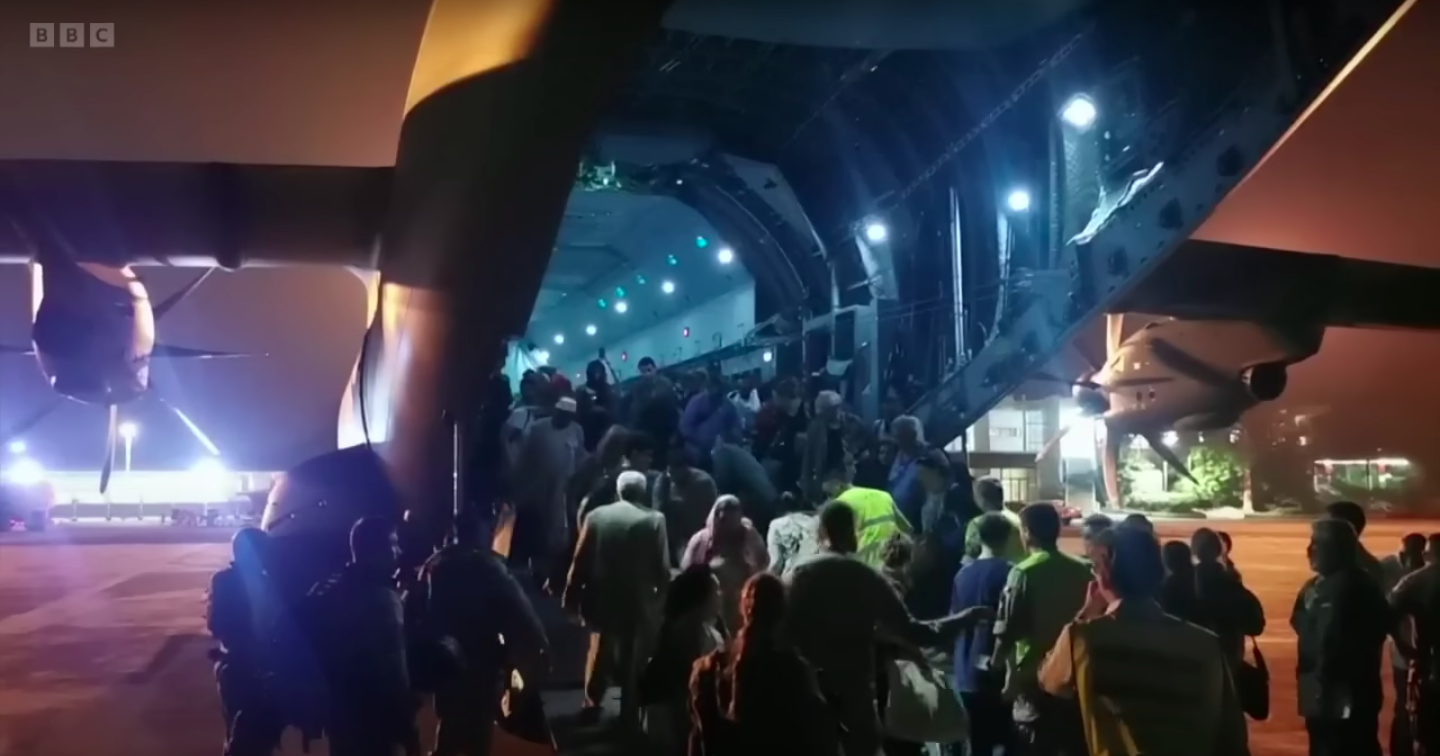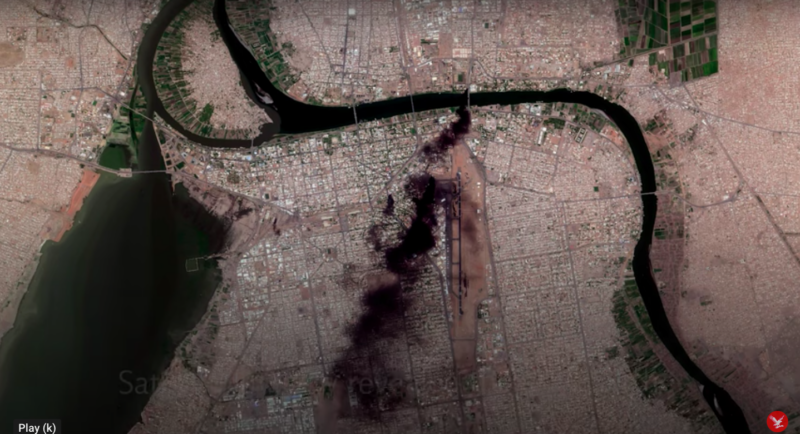The power struggle in Sudan exacerbates the dire humanitarian situation

The Sudanese capital Khortoum is witnessing intense fighting. Screenshot from a video by AlHadath. Fair use.
This story, was originally by Egyptian Chronicles, a personal blog since 2004. An edited version is republished here with permission.
( Globalvoices.org) – The ongoing conflict between Sudan’s Armed Forces, led by Abdel Fattah Burhan -an army general who is the de facto ruler of Sudan- and the Rapid Support Forces (RSF), a group of militias under the command of former warlord General Mohamed Hamdan Dagalo, also known as “Hemedti,” has entered its second week.
During the civil war in Sudan’s western region that began in 2003, Burhan and Hemedi worked together to counter insurgency against Darfuri rebels. However, Burhan was a career soldier, while Hamedti was an ambitious militia leader whose power grew significantly with the support of the Sudan’s then-military ruler, Omar al-Bashir. Al-Bashir set these two men against each other, with the hope that no single armed group would have enough power to depose him. Little did he know that they would end up doing precisely that.
Now, the ambitions of these two military men ambitions have clashed, bringing chaos to Sudan and its people. The ongoing conflict highlights the power struggle between these two infamous generals, and the impact it has on Sudanese civilians caught in the middle.
Refugees Flee, Foreign Nationals Evacuated as Sudan Violence Escalates

Evacuation of foreign nationals from Sudan. The screenshot was captured from a video by the BBC on YouTube. 25 April 2023. Fair use.
Several countries have begun evacuating their citizens from Sudan with the help of neighboring countries such as Saudi Arabia and Egypt. It appears that saving foreign nationals is a top priority, while the citizens of Sudan are not the priority for anyone, especially not for Abdel Fattah Burhan, and Mohamed Hamdan Dalago. People in Sudan fear that, as expatriates depart Sudan, the situation could deteriorate, resulting in more bloodshed.
Meanwhile, hundreds of thousands of Sudanese are fleeing to neighboring countries to escape the violence and chaos that has claimed more than 459 lives so far and left more than 4,000 wounded in the past week and a half, according to UN reports. However, the actual death toll is expected to be much higher.

Satellite imagery captures destruction in Sudan as clashes continue between army and RSF. Screenshot taken from a video by The Independent on YouTube. 17 April 2023. Fair use.
Refugees are heading to both Port Sudan or Wadi Halfa to cross the border into Egypt, as well as west towards Chad.
Satellite imagery shows the aftermath of the intense fighting and the long queues of cars, trucks, and buses on highways leading to the border crossings.
The three-day-ceasefire between the RSF and the Sudanese army, imposed by the US from midnight on April 25, is fragile, with violations from both sides.
The Egyptian government’s response to the Sudan crisis

Thousands of Sudanese refugees are heading to neighboring countries. Screenshot from a video by AlJazeera English on youtube. 26 April 2023. Fair use.
Egypt has eased visa requirements so that women, children, and the elderly over 50 years old can enter Egypt without a visa. As of the publishing of this article, 10,000 people have crossed into Egypt through the Arqeen border crossing. Thousands more are waiting at the Arqeen border crossing, where the Egyptian Red Crescent has established a relief centre.
UNHCR, the UN Refugee Agency, is scaling up efforts to assist people seeking safety in countries neighboring Sudan, where the fighting looks set to trigger further displacement both within and outside the country. However, more relief efforts are urgently needed, especially during an economic crisis.
It’s worth noting that, in 2004, Egypt and Sudan signed the Four Freedoms Agreement that permits citizens of both countries to move, live, work, and own property without restrictions. However, despite being signed and ratified, the agreement has not been fully implemented, particularly regarding freedom of movement, due to national security concerns from both nations.
The Egyptian Foreign Ministry called for Egyptian citizens residing outside Khartoum to head to either the city of Wadi Halfa in Northern Sudan or Port Sudan in Eastern Sudan to be evacuated on Sunday, April 23. Over the past 48 hours, over 1,000 Egyptians have returned aboard military planes. The ministry also urged Egyptian citizens in Khartoum to remain safe until they receive instructions from the Egyptian Embassy, given the volatile situation.

Refugees at Arqeen Crossing. Screenshot from a video by ON. 27 April 2023. Fair use.
Egyptian and Sudanese armed forces are working together to initiate these evacuation operations. Sudan has provided Egypt with information on safe corridors leading to designated evacuation sites. News reports indicate that the Sudanese army is escorting convoys of Egyptians to the border crossings between the two countries for their evacuation.
So far, two Egyptian citizens in Khartoum have been reported dead, including Mohamed El-Gharawy, an administrative assistant working at the Egyptian Embassy in Khartoum, who was killed while in his car on his way to the embassy on Monday. The Sudanese Army has accused the RSF of being responsible for the attack, while the RSF has claimed it will cooperate with the Egyptian authorities to identify the culprit.

Intense street fighting creates a dangerous environment for civilians, hindering their ability to move safely. Screenshot taken from a video by AlArabiya on YouTube. 26 April 2023. Fair use.
Saber Nasr El-Din, a 23- year-old student at Khartoum University’s Faculty of Medicine, also passed away on Sunday due to a severe drop in blood pressure. His roommates reported that he suffered due to his diabetes and was unable to find insulin because of the ongoing conflict.
Nasr El-Din’s family, who reside in Assuit’s Dayrout, was unable to transfer his body from the apartment where he was staying in Khartoum due to the ongoing fighting. His mother made social media pleas for him to be brought back to Egypt to be buried in his hometown in Upper Egypt. However, Nasr El-Din’s father, Mohamed Nasr, announced that his son was buried in a cemetery in Khartoum for the time being.
The young Egyptian student was not the only victim of the dire humanitarian situation in Sudan. The collapse of the health sector in the capital has led to over 52 hospitals in Khartoum being completely out of service due to the lack of power and medical supplies.
Via Globalvoices.org



 © 2025 All Rights Reserved
© 2025 All Rights Reserved